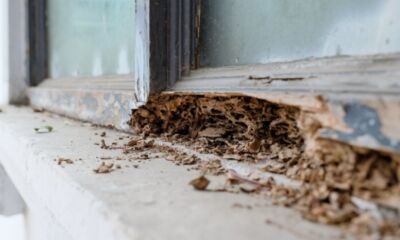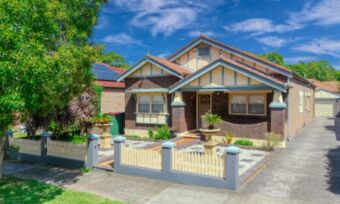How much does termite treatment cost in 2025?
With termite treatment costs potentially running into the thousands, this is one bug to get tough with. Here’s a quick guide on ways to identify a termite infestation and how much you could be looking at in termite treatment costs.

With termite treatment costs potentially running into the thousands, this is one bug to get tough with. Here’s a quick guide on ways to identify a termite infestation and how much you could be looking at in termite treatment costs.
KEY POINTS
- Termites are small insects that feast on the wood in your home and can potentially cause costly damage.
- A pest inspection can help to identify if your home has been affected by termites and usually costs between $250 to $500.
- You can prevent termites from entering your home by using termite resistant timbers, storing timber away from the soil around your home’s foundations and ensuring the timber structure of your home is not in contact with soil or the ground.
Your home is a valuable investment, and that’s why it’s worth keeping an eye out for termites. According to the University of Technology Sydney, these timber-loving pests are a huge problem in Australia, causing more than $1.5 billion worth of damage to homes each year. A single colony can have more than 10 million workers, all feasting on your home.
The Australian Environmental Pest Managers Association (AEPMA) warns that termites are becoming an increasing problem, citing changes in construction techniques and practices since the 1960s as a major factor. Homes currently being constructed with concrete slabs that have little clearance from the ground—as well as the use of softwood timber for framing—are some of the techniques that increase termite vulnerabilities. With one of the most destructive termite species in the world making its home in North Queensland, the Northern Territory and Western Australia, termites also thrive in the tropical humid climate prevalent in those areas.
So what happens if the roof over your head becomes a feast for tiny, crawling pests?
Signs you may have termites
The thought of termites may make you think of dilapidated homes falling apart as wood crumbles. But in reality, termites in walls are often invisible to the naked eye. According to hipages, an online marketplace connecting customers to tradies, some common signs to look out for include:
- Termite remains, such as droppings, wings or powdery residue around the house
- Termite tunnels and mud tubes along walls
- Damage to walls including chipping, flaking, holes and dampness
- Timber doors and windows becoming hard to open
- A hollow sound when you tap interior timbers.
Pest company Rentokil advises that clicking sounds coming from the walls or ceiling may indicate the presence of termites. This can be the sound of termites noisily eating, or soldier termites banging their heads against timber to warn the colony of danger.
How much does termite inspection cost?
If you suspect you have termites, the first step is to have a pest professional inspect your home. Quotes sourced on hipages show termite inspection costs are usually around $250 to $500, depending on the size and location of the home and if specialised equipment is involved. Shopping around can help you find a service that may fit within your budget.
How much does termite treatment cost?
If it turns out you do have a termite infestation, quotes on hipages range anywhere between $300 and $3,500 to treat the problem. It may not be cheap, but ultimately you could be protecting the structural integrity of your home. Due to the high cost, getting a few quotes to compare can be worthwhile. Exactly how much you pay will depend on the scale of the infestation, the type of treatment used and the pest control company you hire for the job.
Termite treatments and their costs
Treatments that involve spraying, dusting or injecting foam directly to affected areas, such as windowsills, can cost between $300 and $900.
A termite baiting system can cost between $2,500 to $3,500 and must be repeated, usually on a monthly basis, which can add around $800 per visit to the expense.
A termite barrier, which can come in the form of a trench treatment, chemical soil treatment or physical blanket barrier around the home, could cost as much as $5,000.
Who can provide termite treatment?
There is a wide range of pest management specialists to select from, with the Australian Pest Control Association (APCA) recommending shopping around and comparing costs. You can also enquire about the range of treatment options that different companies may provide.
One place consumers can start their search is on the AEPMA site directory, where members need to be qualified and committed to follow industry codes of best practice in order to be listed.
Is termite treatment cost covered by home insurance?
Unfortunately, it’s unlikely that termite damage or any termite treatment cost will be covered by your home building insurance.
The majority of home insurance providers exclude loss or damage caused by insects, vermin and other household pests—including termites—from their home insurance policies. This is because watching out for pests like termites, as well as dealing with them, is regarded as a part of regular home maintenance.
What to do if you find termites on your property
According to the Australian Museum, there are more than 300 termite species in Australia, but only a few of the wood-damaging species are a concern to humans. The control of “pest termites involves identifying the species, locating the nest and choosing appropriate eradication methods”.
You may find products designed to kill termites in your local hardware store. However, it could be a good idea to consider seeking professional help. hipages warns that because they live in large colonies, termites can be hard to get rid of—especially those that live below the ground that are known as subterranean termites.
A termite management specialist can recommend a treatment plan specifically for your needs. By calling in a specialist, you also minimise personal handling of what can be toxic pest elimination chemicals.
How to prevent a termite infestation
Like many household pests, when it comes to termites, prevention can often be a good way to avoid large treatment costs. There are plenty of simple and low cost steps that homeowners can take to avoid sharing their home with termites.
If you are buying a home, it makes a lot of sense to organise a pre-purchase pest inspection before you commit to buying the property. hipages notes that this service can cost around $250. While it may be an additional expense for homebuyers, it can be a big money saver if the inspection identifies a serious termite problem.
It’s also a good idea to have an annual pest inspection after you move in. Subterranean termites have the potential to chew through wall and roofing timbers within a matter of months.
Other basic preventative measures sourced from the Government of Western Australia that can safeguard your home from termites, include:
- Using termite resistant timbers below floor level or when renovating
- Ensuring that your home’s timber structures are not in contact with soil or the ground
- Avoiding storing timber directly on soil and around your home’s foundations
- Ensuring that spaces under the floor are well ventilated and dry by keeping weep holes and other ventilation and drainage systems functional and free from debris
- Fixing any drainage problems, plumbing and roof leaks—termites love moisture and humidity
- Keeping vegetation away from your home’s foundations and outside walls
- Removing any dead trees and stumps as soon as possible.
Remember, if you see any signs that could indicate termites, it’s worth taking prompt action before the insects eat away at your home and potentially the savings in your bank account.
Additional reporting by Nick Whiting.
Cover image source: Attapon Thana/Shutterstock.com
This article was reviewed by our Finance Editor Jessica Pridmore before it was updated, as part of our fact-checking process.

Karen is the Senior Content Production Specialist at Canstar, working to help the company produce informative yet easy-to-digest financial content for Australian consumers. Karen has a background in allied health, having completed a Bachelor of Podiatry from the Queensland University of Technology.
Karen embarked on a second career to rekindle her childhood passion for writing, while still maintaining her earnest intentions from her health professional background — to help the general public. In 2023, she completed a Graduate Certificate in Writing, Editing and Publishing at the University of Queensland. Karen strives to bring a fresh perspective and accurately represent the average consumer.
You can connect with Karen via Linkedin.
The comparison rate for all home loans and loans secured against real property are based on secured credit of $150,000 and a term of 25 years.
^WARNING: This comparison rate is true only for the examples given and may not include all fees and charges. Different terms, fees or other loan amounts might result in a different comparison rate.
 Owner occupied
Owner occupied
 20% min deposit
20% min deposit
 Redraw facility
Redraw facility
Try our Home Loans comparison tool to instantly compare Canstar expert rated options.





